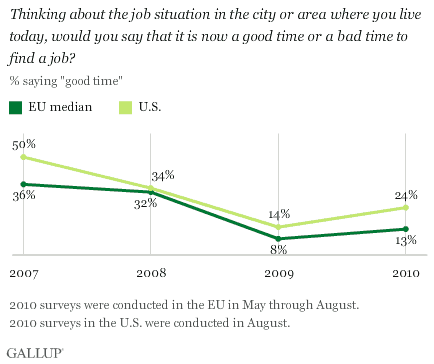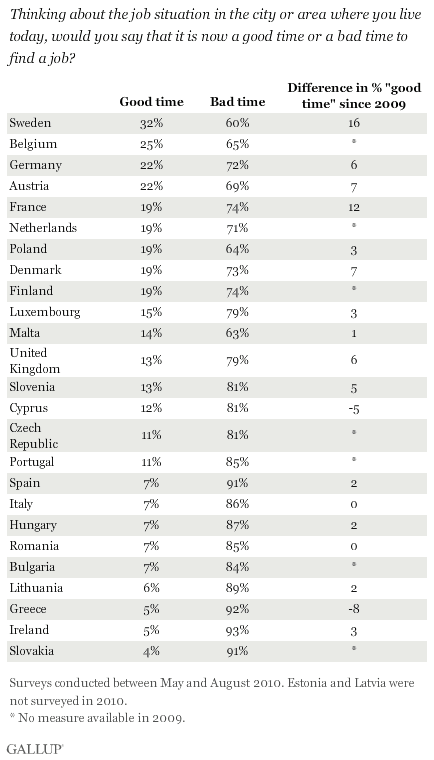WASHINGTON, D.C. -- Europeans' evaluations of their local job markets were universally grim last year and even more dismal than Americans' assessments; neither are positive signs heading into 2011. A median of 13% across the 25 EU countries Gallup surveyed in 2010 said it was a good time to find a job in their communities, compared with 24% of Americans.

Americans historically have been more positive about their job market than many EU residents, but that gap narrowed as views became more negative on both sides of the Atlantic during the global economic crisis. The gap showed signs of widening last year, with residents in only a few countries -- Germany, Austria, and Belgium -- as likely as Americans to say it was a good time to find a job.
EU residents' overall assessment of their job market in 2010 was better than in 2009, but they were still more negative than before the global economic crisis hit. A mix of euro-zone and non-euro-zone countries such as Sweden, France, Denmark, Austria, the United Kingdom, and others led any improvements, but assessments didn't change meaningfully elsewhere.

In countries where unemployment was highest last year, such as Spain, Ireland, Greece, and Slovakia, nearly all residents said it was a bad time to find a job in their local communities. Perceptions about the job market have been dismal in these countries in the past two years, but in bailout recipient Greece, they have worsened with austerity measures and efforts to shrink the public sector.
Implications
Across Europe, governments are cutting hundreds of thousands of public-sector jobs and wages and employing other drastic measures to reduce their deficits. For many Europeans, 2011 will be a difficult year, and their perceptions about the job market aren't likely to improve in the immediate future. Governments will need to focus intently on stimulating job creation in the private sector to not only keep their economies growing, but also to keep a skeptical public on board with the austerity measures leaders hope will make economic growth possible.
For complete data sets or custom research from the more than 150 countries Gallup continually surveys, please contact SocialandEconomicAnalysis@gallup.com or call 202.715.3030.
Survey Methods
Results are based on face-to-face and telephone interviews with approximately 1,000 adults in each EU member state, aged 15 and older, between May and August 2010. For results based on each sample of national adults, one can say with 95% confidence that the maximum margin of sampling error ranged from a low of ±3.5 percentage points to a high of ±4.0 percentage points.
Results are based on telephone interviews with approximately 1,000 adults in the United States, aged 15 and older, conducted in August 2010. For results based on each sample of national adults, one can say with 95% confidence that the maximum margin of sampling error is ±3.9 percentage points.
